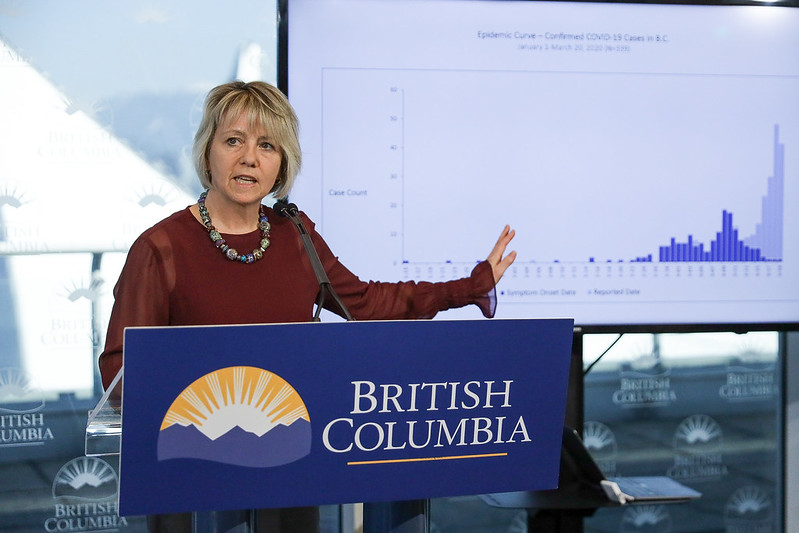Several updates have been given on B.C.’s COVID-19 models regarding case numbers, transmission rates, and possibilities going into the future.
Dr. Bonnie Henry, Provincial Health Officer said that B.C. has been effective at bending its epidemiological curve, although case numbers have kept rising.
Compared to other countries and provinces, B.C. has done well in keeping its number of new cases and deaths low, however, there are concerns regarding B.C.’s neighbours.
“What’s concerning, of course, is the increase we continue to see in a number of countries, particularly the U.S., which we know directly affects us,” said Henry.
Henry added that an important measure is the number of new cases in which the origin is unclear.
“We still have a small number of cases that arise that we are unable to determine where their infection came from, but those are very small numbers,” explained Henry. “More importantly, we are able to link the vast majority of cases that we have, particularly in recent weeks, all of our cases have been linked.”
Imported cases are continuing in B.C. as well, with infected people coming into the province via international travel, mostly from Canadians who are returning from abroad.
Henry added that following an outbreak among temporary foreign workers in the agriculture sector, all newly arrived workers must submit to a 14-day quarantine before they may work. So far, 27 infections have developed while under isolation in those coming from outside of the country.
Henry offered a number of possibilities of case numbers into the future depending on how much contact with others is maintained but emphasized that this is by no means a set in stone prediction.
“If we go with dramatically increased, so into 80% or back to what used to be normal, we can expect to see more cases, and we run the potential risk of having a rapid rebound in cases. That is what we want to avoid, we want to stay where we are, where we’re having safe contacts.”
Reproductive numbers have also been on a downturn in B.C., which means that each infected person is transmitting COVID-19 to much fewer people than before.
“Early on, that reproductive number was quite high, because we weren’t recognizing new cases and they had lots of people they were in contact with,” said Henry. “We know from data I presented before, on average, a case had 11 people they were in contact with.”
Due to measures put in place and people obeying orders from health authorities, Henry said that the reproductive rate is less than one, meaning that most infected people don’t transmit the virus at all. Henry added that keeping the reproductive rate around one or less than that is vital to lifting restrictions.
A new method of testing for COVID-19 in the works from the public health lab within the BCCDC. This testing method builds off of techniques used to test for polio.
“They are working to develop a way to be able to monitor wastewater across the province as an indicator when the virus may be in our communities. This is something we’ve seen in a number of countries around the world,” explained Henry. “This is something that we’re planning on rolling out and using in the coming months, particularly in smaller communities.”
This method of testing looks for the virus’ RNA in water samples taken from a community’s wastewater system. Henry said that testing has been done using this method for the last five weeks in the Vancouver area, with no positive samples yet, which she said reflects a low rate of transmission.





